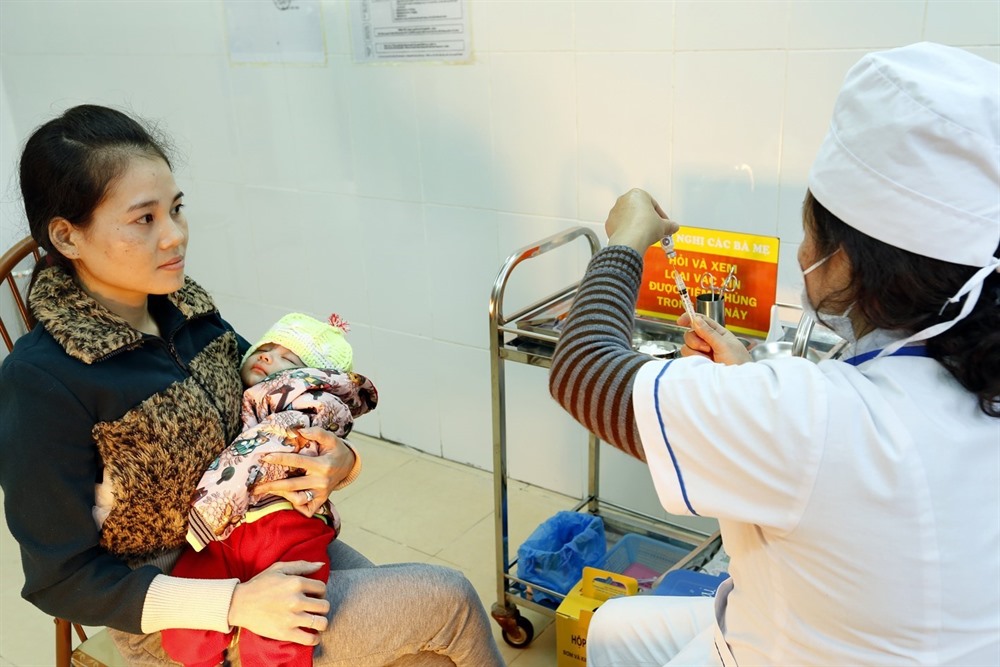 Society
Society

After Tết (Vietnamese New Year) Holiday, medical facilities offering vaccination services in the central city of Đà Nẵng have received a huge influx of parents and infants, worrying about severe complications from the ComBE Five vaccine used in the national expanded immunisation programme (EIP).
 |
| A baby receives the ComBE FIVE vaccine in Hà Nội. — VNA/VNS Photo Dương Ngọc |
HÀ NỘI — After Tết (Lunar New Year) Holiday, medical facilities offering vaccination services in the central city of Đà Nẵng have received a huge influx of parents and infants, worrying about severe complications from the ComBE Five vaccine used in the national expanded immunisation programme (EIP).
Half of the parents come from other provinces, including Quảng Nam, Quảng Ngãi and Bình Định.
Đà Nẵng City Centre for Disease Control has been overwhelmed any time a new batch of a 6-in-1 vaccine preventing diphtheria, tetanus, pertussis, hepatitis B, polio and meningitis is offered.
While vaccines on the EIP are free, many parents have been paying for private doses as they don’t trust the free options, according to Trần Bảo Ngọc, deputy head of the centre’s General Examination Department.
A private vaccine dose costs nearly VNĐ1 million (US$43), while a package for all necessary vaccines in early years costs some VNĐ20 million ($859), yet hospitals are running out of stock for these vaccines due to high demand.
Some 400,000 ComBE FIVE vaccine doses have been distributed to 63 provinces and cities after replacing Korean-made Quinvaxem in December last year.
Indian-made ComBE Five is a “five-in-one” vaccine that can help fight five common, potentially fatal diseases affecting infants – diphtheria, tetanus, whooping cough, hepatitis B and Haemophilus influenza type B.
Several cases of severe reactions have been reported, with the northern province of Nam Định reporting two deaths due to vaccine since December, compared to none in nearly a decade of using Quinvaxem.
In addition, the central province of Bình Định had to stop using a batch of ComBE FIVE vaccine following an infant’s death in February.
According to Đặng Đức Anh, director of the national EIP, mild fever under 38.5 degrees Celsius and a slight pain around the injection are common reactions.
Severe reactions like high fever, convulsions and anaphylaxes may occur at a rate of 20 out of 1 million injections.
Since October 2018, some 23,200 children have received ComBE FIVE vaccine in Bình Định, with 689 children experiencing normal reactions and 20 severe complications and one death.
Monitoring reactions
According to Anh, Quinvaxem and ComBE FIVE have the same percentage of reactions.
Lê Quang Hùng, director of Bình Định Province Department of Health, advises parents to tightly monitor children’s conditions after having vaccines.
“If they show any strange signs like high fever or shortness of breath, please take them to the nearest medical facility. With normal reactions, it takes up to two days for a baby to recover. A patient suffering serious symptoms will receive treatment immediately,” said Hùng.
Nguyễn Quang Thông, director of Cần Thơ City Centre for Disease Control, said thanks to training on vaccine preservation, injection techniques and post-vaccine monitoring, mild fever was the only side-effect babies being administered at the centre had.
However, only 59 per cent of children under 1 were vaccinated in January in Can Tho.
According to experts, immunisation is important as it protects children from disease. Therefore, medical facilities are urged to prevent vaccine shortages from occurring. — VNS




